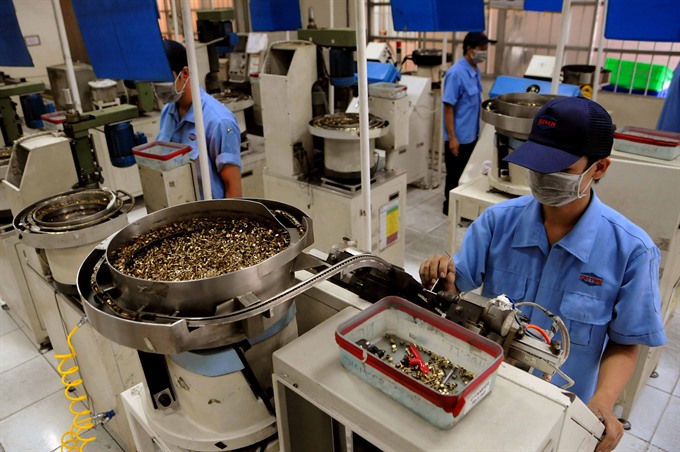 Economy
Economy

Việt Nam needs a new generation of foreign direct investment (FDI) strategies, which should focus on seeking investment from the US and European Union, according to experts.
 |
| Workers at the Cát Thái Manufacturing and Trading Company Limited process metal parts, rubber, paint, molds and plastic resins for foreign enterprises in Việt Nam and for export to many countries in the region and the world. — VNA/VNS Photo An Hiếu |
HÀ NỘI — Việt Nam needs new strategies of foreign direct investment (FDI), which should focus on seeking investment from the US and European Union, according to experts.
According to a preliminary draft for the FDI strategy for 2018-23, based upon current development in Việt Nam, investment in the nation should focus on those sectors having advantages, as well as sectors that foreign companies could bring more benefits to, rather than domestic firms.
The draft built by the Ministry of Planning and Investment (MPI) and the World Bank sets out priority sectors for attracting FDI, such as those that needs increased value and competitiveness, including manufacturing (high-grade metals/minerals/chemicals/
In the short term, priority is to be given to industries with narrow opportunities for competition, such as production (automotive and transport equipment OEMs - Original Equipment Manufacturers and suppliers), and environmental technology (water conservation equipment, solar, wind), reported the Nhà đầu tư (Investor) Magazine.
In the medium term, priority should be given to sectors that create and develop skills, including manufacturing (pharmaceuticals and medical equipment), services (education and health services, financial services, financial technology (Fintech), information technology and intellectual services (accounting and design).
The draft also proposed solutions to enhance efficiency in the operation of the Foreign Investment Agency (FIA) under the MPI.
It recommended that Việt Nam should remove entry-barriers and maximise the impact of incentives in attracting investments.
Reforms are also needed to more effectively anchor existing investors and motivate them to expand their activities in Việt Nam.
The nation needs to maximise the absorption potential of local companies by strengthening linkages with global value chains.
Nguyễn Mại, chairman of the Vietnam Association of Foreign Invested Enterprises (VAFIE), said that this is one of the important contributions for the orientation of foreign investment in the future.
However, Mại said foreign investment can not be separated from the socio-economic development strategy being carried out throughout the country. At present, Việt Nam is implementing the 10-year socio-economic development strategy from 2011-20. Therefore, the period of the FDI strategy should be adjusted to be appropriate for the 10-year socio economic development strategy, because the period of the FDI strategy for 2018-23 is too short.
The FDI strategy also needs to address the issue of attracting more investors from the US and the EU, Mại said.
What Việt Nam needs to focus on is attracting investment from the US and the EU in the future, but not Japan, South Korea and China. If not resolved, investment in Việt Nam will remain based mainly on Asian countries, Mại said.
The strategy should pay attention to promoting more foreign investment in difficult provinces. Although the Government has offered many incentives, few investors have come to the northern mountainous and Central Highland provinces, he said.
Meanwhile, Phan Hữu Thắng, former director of the FIA, said that the strategy on attracting a new generation of FDI should take into account policies relating to the three special economic zones of Phú Quốc, Vân Đồn and Bắc Vân Phong, because the final development plan of three zones will be approved next year.
Further, Nguyễn Anh Tuấn, vice chairman of VAFIE and Editor-in-Chief of Investor Magazine, said the list of priority areas in the draft lacks infrastructure that needs huge investments, while domestic investment can not meet the existing demand.
Currently, there is no FDI project in the transportation sector. For instance, Long Thành Airport and the North-South Highway need large amounts of capital. Việt Nam should attract foreign investors to this sector, because it needs both capital and technology, Tuấn said. — VNS




